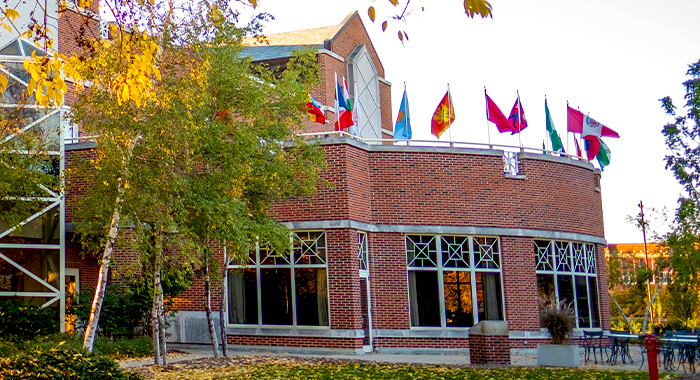Philosophy Class Partners With Applicants on Path to Citizenry
Refugees and immigrants in northeast Wisconsin on the path to United States citizenship are befriending some new supporters. Since fall 2021, a group of St. Norbert College students has been assisting with citizenship classes and practice interviews as volunteers. That outreach has now become part of a new community-based service-learning course introduced in the 2022 spring semester.
Jaime Edwards (Philosophy) developed the course, titled Migration, Refugees & Citizenship: Ethical Foundations. “Every fall, I teach a human rights course,” says Edwards. “Inevitably, a student question comes up. ‘So, we are studying all this stuff, we are watching documentaries, there are these different issues, where would I even begin to intervene?’ There’s definitely a sense of helplessness among the students. What I try to do is keep us in conversation with people who maybe can help mentor us and take on these questions.”
The desire to help
Edwards and a group of interested students met with Kristina Shelton, a member of the Wisconsin State Assembly, to learn about important issues and ways to become involved. Shelton suggested numerous area organizations that are making a difference, including COMSA – Green Bay, a resource center that provides services for Somali refugees and other immigrant communities.
“I met with some people who work with COMSA and asked, ‘What can we do that would be useful?’ Not just an education for us, not where we are in the way, not something trivial; where we could actually be of use,” says Edwards.
COMSA partners with H. James Smet, a volunteer who runs a twice-weekly U.S. citizenship class and arranges one-on-one interviews with the community students (refugees and immigrants) to help them prepare for their actual interviews with the U.S. Government. St. Norbert students were invited to join the team and received training.
From volunteerism to coursework
“We were doing it as volunteers, completely after hours,” says Edwards. “I thought this would be nice to integrate into a community-based course. I proposed the course.” He says he has received incredible support from Jennifer Hockenberry, humanities dean, as well as the Sturzl Center for Community Service & Learning.
The course is capped at nine students, who apply for admission. “I want my students to really do a substantial amount of community work. There is only so much to go around as it stands,” says Edwards.
The two-credit course consists of meeting once a week and reading various books focused on the philosophy of immigration, open borders and cosmopolitanism, for example. “We read and discuss this scholarly work together and then we also serve as the hub to student sign-up,” says Edwards. “They go and lead community-engaged sessions helping people study for the U.S. citizenship exam.”
The community students on the path to citizenry are at various stages of English language learning, so some of the efforts by the SNC class involves helping improve English skills, while also studying for the exam. One man in the program was just beginning to learn English, so his young son, assisted with translation, shares Edwards.
The community students and St. Norbert students meet virtually, but discussion is ongoing about in-person opportunities, adds Edwards. The virtual format has allowed refugees and immigrants who originally moved to Green Bay but have since relocated to other cities to continue in the citizenship classes. The focus is entirely about how the St. Norbert students can help those seeking U.S. citizenship, says Edwards. Any benefit the college students receive is secondary.
“I want you as student, and myself, to not be so preoccupied with what you are getting out of it, that you start seeing the project as an occasion for your own personal development and forget that we are here to help that person,” explains Edwards. “That’s a tricky balance here. I do want them to go from seeing people as strangers in our midst to these people I can laugh with, joke with, be friends with. It’s harder to be dismissive when this person’s become my friend.”
Early success and the future
A second iteration of the course, titled Migration, Refugees & Citizenship: Contemporary Discussions, was added for the fall semester, so students can continue the study and work. These service-learning courses will be offered for the foreseeable future, says Edwards.
A group of community students, including those assisted by St. Norbert students, became U.S. citizens over the summer. “Originally, the biggest group is Somali refugees, but it’s been extended. It’s open to anyone who is here. I suspect when we have new refugees coming into the area the community will evolve and change in neat ways,” says Edwards. “I’m proud of my students’ contributions. As things are getting back post-pandemic, we will definitely be having some celebrations and graduation parties (with the community students).”
Oct. 27, 2022












